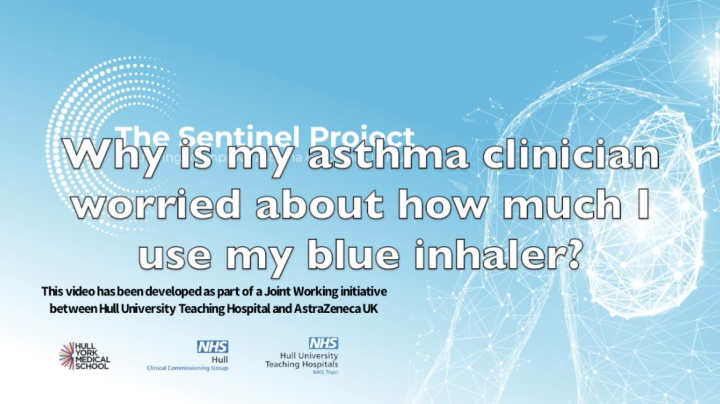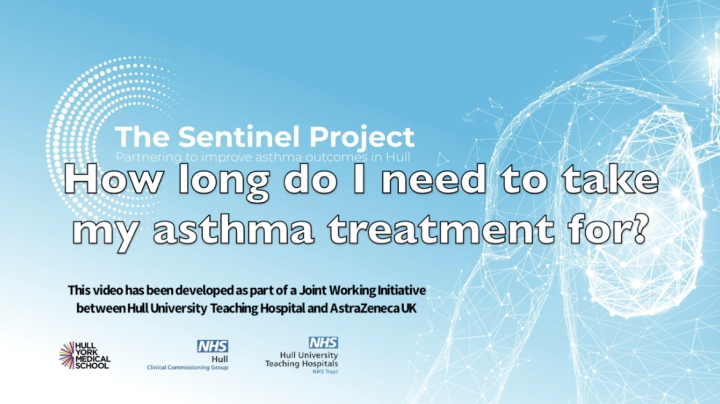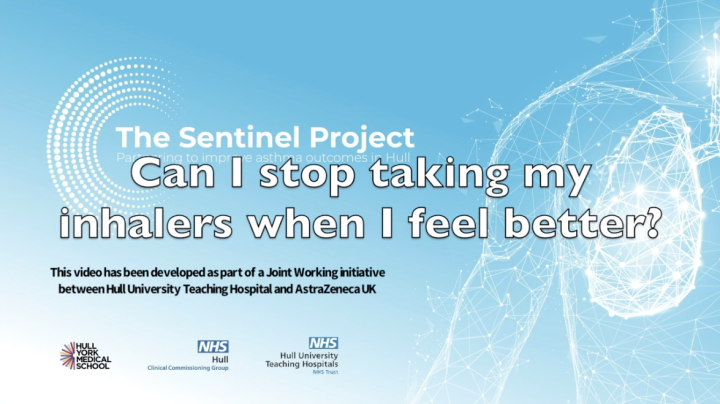Patient Support
The following information has been developed by local asthma clinicians to answer some key questions about asthma and how it is treated. This information is not designed to replace specific advice given to you by your asthma clinician and if you are unsure about any aspect of your asthma or its treatment, you should discuss this with the doctor, nurse or pharmacist who usually looks after your asthma.
Please download our patient support guide here:
What is asthma?
Asthma is a condition in which the airways in the lungs become inflamed. This can lead to symptoms such as breathlessness, cough and wheeze. The inflammation can cause the airways to be sensitive to ‘triggers’ which can bring on an asthma attack. During an asthma attack, the airways become more inflamed and the muscles in the airway tighten, causing the airway to narrow and making it harder to breath.
What is inflammation?
Inflammation is the body’s natural reaction to injury or infection. In some diseases, inflammation develops in a part of the body and can lead to symptoms and stop the effected part of the body from working properly. Most people will recognise the common features of inflammation which include redness, swelling, pain and a hot feeling of the effected body part. A common example that many people have experienced is sunburn in which the skin becomes inflamed. In asthma, the inflammation develops in the airways in the lung. Because the airways in your lung are not sensitive to pain, the main symptoms result from swelling and sensitivity of the airway that lead to airway narrowing.
How is asthma diagnosed?
Asthma is diagnosed by a health care professional based on a combination of your symptoms, examination findings, test results and observing how you respond to treatment. There is no single test to diagnose asthma and therefore your doctor or nurse will ask you a series of questions and undertake tests to look for evidence of inflammation and airway narrowing which can vary over time. Breathing tests are important to diagnose asthma and some people may also have blood tests. Once a diagnosis of asthma is confirmed, you should be prescribed regular asthma treatment including a preventer inhaler (see below for further information about asthma treatment).
How is asthma treated?
Asthma treatments aim to control your asthma so that you are symptom free, do not suffer asthma attacks, and your lung function remains normal. Asthma is mainly treated using inhalers that deliver medications directly to the airways in your lung. Tablets and other medications can be added to inhalers to help to control your asthma.
Asthma inhalers are often considered in two groups:
- ‘Preventer’ inhalers
- ‘Reliever’ inhalers
Preventer inhalers are very important in treating asthma because they contain a steroid medication to directly treat the airway inflammation that drives your asthma. Inhaled steroids are sometimes used alone or in combination with other medicines (bronchodilators) and are a critical component of asthma treatment. You should take your preventer inhaler every day to control the inflammation in your airways and prevent asthma symptoms and asthma attacks (even if you feel well with no asthma symptoms). If your asthma symptoms are not controlled on a preventer inhaler that contains an inhaled steroid and bronchodilator, other preventer medications might be suggested to help to control your asthma.
Reliever inhalers are used to provide short-term relief from asthma symptoms. Reliever inhalers work by relaxing the muscle in the airway to reduce the narrowing that can occur in asthma and during an asthma attack. Although the reliever inhaler makes you feel better, the benefit is short-term as it does not treat the airway inflammation that is driving your asthma symptoms. This is why it is so important that you take your preventer inhaler as prescribed. If you are needing to use your reliever inhaler regularly (3 or more times per week) then your asthma may be uncontrolled and you should arrange to speak to your asthma clinician to consider whether your preventer medications need to be adjusted. Your asthma clinician may be a doctor, nurse or pharmacist who has an interest in asthma.
Some inhalers can be used as both ‘preventers’ and a ‘relievers’ using an approach called Maintenance and Reliever Therapy (MART). Only certain inhalers can be used in this way so please follow the advice of your asthma clinician. MART inhalers contain both an inhaled steroid (to treat the airway inflammation) and a fast and long-acting bronchodilator (to relax the muscle in the airway and relieve asthma symptoms). The MART approach can help to improve asthma control and prevent asthma attacks by ensuring that the airway inflammation in asthma is effectively treated. With the MART approach, you use the same inhaler to control your asthma and to relieve asthma symptoms.
Everyone with asthma should have a personalised asthma action plan that details the medication that you take for your asthma and what to do if your symptoms get worse or you have an asthma attack. These personalised action plans should be reviewed every year with your asthma clinician. If you do not have a personalised asthma action plan, please speak to your asthma clinician at your doctor’s surgery so that they can create one with you.
Why is my asthma nurse / doctor concerned about how much I use my ‘reliever’ inhaler?
Your reliever inhaler is designed to provide short-term relief of asthma symptoms while your preventer medications control the inflammation that is driving your asthma symptoms. If you need to use your reliever inhaler 3 or more times per week, this suggests that you are experiencing regular asthma symptoms. If this is the case, your asthma clinician will want to understand what is causing your symptoms so that they can adjust your treatment, improve your asthma control and reduce your risk of having an asthma attack in the future.
We know people that use their reliever inhaler 3 or more times a week are at a higher risk of having a future asthma attack than those that do not. If you are using your reliever inhaler this often, your asthma clinician may invite you for a review to make sure you are taking the best possible preventer treatments to control your asthma. To find out more about your personal asthma attack risk you can find out more by visiting the Asthma UK Website (Asthma Attack Risk Checker | Asthma UK).
What do I do if I don’t know how to use my asthma inhaler?
There are lots of inhalers available and they can often look very different and require a different technique to ensure that the medication reaches the airways in your lungs. Your asthma clinician will be able to show you how to use your inhaler and if you are not sure, you should ask them.
Even when you have been using an inhaler for a long time, it is easy to forget all of the steps that are needed to use it most effectively. It is therefore recommended that your inhaler technique is checked during each asthma appointment and that you are shown how to use your inhaler effectively. If you want to check how to use your inhaler you can search for your inhaler and view a video on the Asthma UK website (How to use your inhaler | Asthma UK).
What do I do if my asthma treatment has been changed and I don’t like it?
If you have had your asthma treatment changed and you feel that it is not helping you, you should contact your asthma clinician to discuss how you are feeling and agree a treatment plan. It is important to remember that your treatments were changed for a reason and going back to your old treatment is not always the best thing to do. Your asthma clinician will be able to explore other options to improve your asthma control.
Why might I have been referred to the hospital asthma clinic?
There are many reasons that the asthma clinician at your local surgery may ask for you to be seen by the asthma team at the hospital. Sometimes this can be if there is a question about your asthma diagnosis or to look into other possible causes for your symptoms. Other times it can be that you are on all of the asthma treatments available to your asthma clinician but your asthma is still not controlled. The asthma team at the hospital have access to specialist tests and asthma treatments that can sometimes help people with certain types of asthma.
What is asthma control?
Asthma control takes into account:
- How your asthma affects you now (e.g. symptoms, activity limitation, airway narrowing, and reliever medication use).
- Your future asthma risk (e.g. risk of asthma attack, loss of lung function, side effects of treatment).
With this in mind, if your asthma is well controlled you could expect to not have any symptoms related to your asthma, be able to continue your usual daily activities, not need to use your reliever medication and be at low risk of future attacks or treatment related side effects.
There are many reasons that somebodies asthma may be uncontrolled. The important thing is that if your asthma is not controlled, your asthma clinician is aware and has considered what can be done to optimise your control.
 Play Video
Play Video
Why are inhaled steroids so important in asthma?
 Play Video
Play Video
Why is my asthma clinician worried about how much I use my blue inhaler?
 Play Video
Play Video
Why might my blue inhaler have been stopped?
 Play Video
Play Video
What is the Sentinel Project?
 Play Video
Play Video
What is maintenance and reliever therapy?
 Play Video
Play Video
What is asthma control and why is it important?
 Play Video
Play Video
What is asthma?
 Play Video
Play Video
What do I do if my asthma is uncontrolled?
 Play Video
Play Video
How long do I need to take my asthma treatments for?
 Play Video
Play Video
Why is my asthma clinician worried about how often I use my blue inhaler?
 Play Video
Play Video
Can I stop taking my inhalers when I feel better?
 Play Video
Play Video
How is asthma treated?
If you get any side effects, talk to your doctor, pharmacist or nurse. This includes any possible side effects not listed in the package leaflet. You can also report side effects directly via the Yellow Card Scheme at www.mhra.gov.uk/yellowcard.
By reporting side effects you can help provide more information on the safety of your medicine.



